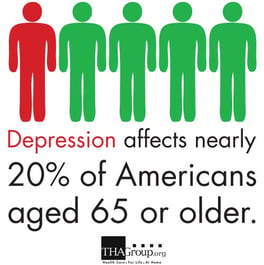 Many Midwesterners experience the winter blues. The days are short, cold and gray. People are cooped up indoors. It’s easy get bored or a little case of cabin fever, to feel sad, to eat less and sleep more.
Many Midwesterners experience the winter blues. The days are short, cold and gray. People are cooped up indoors. It’s easy get bored or a little case of cabin fever, to feel sad, to eat less and sleep more.
But how do you know when your older parent is actually exhibiting not the winter doldrums, but signs of serious clinical depression?
Depression is linked with various chronic medical conditions like obesity, heart disease and dementia, and is strongly correlated with early death in seniors. It’s estimated that about 6 million Americans 65 or older suffer have some form of depression, but only 10 percent seek treatment for it.
Today, let’s take a look at the signs and symptoms you should watch for, and discuss some of the measures you can take to help your older mom or dad cope if he or she is depressed.
There are two types of clinical depression
And the symptoms are similar for both. The hallmark differentiators are persistence and severity. Signs that a senior might be depressed include:
- Sadness
- Erratic mood swings
- Feelings of joylessness (anhedonia), emptiness, worthlessness, or apathy
- Social withdrawal or avoidance behaviors
- Sudden or uncontrollable crying or angry outbursts
- Persistent anxiety and/or panic attacks
- Persistent, minor aches and pains that have no discernible physical cause
- Indigestion or heartburn
- Unusually strong pessimism or hopelessness
- Difficulty concentrating or difficulty recalling details
- Insomnia (sleeping little) or hypersomnia (sleeping too much)
- Changes in appetite or weight (some people eat little or nothing, some binge)
In instances of minor depression, episodes may last days to weeks, but symptoms resolve on their own and typically aren’t severe. Chronic recurrences of minor depression may indicate a larger underlying issue, such as a mood disorder or developing major depression.
Major depression, on the other hand, isn’t mild or episodic. It can last for months or years and doesn’t resolve without clinical intervention.
Seniors suffering from major depression may exhibit any or all of the symptoms above. Some resort to substance abuse to cope — they drink to excess, abuse prescription narcotics, or abuse anti-anxiety medications.
In addition, some seniors with major depression may begin to experience feelings of wanting to hurt themselves or others. It’s very important that any senior exhibiting symptoms of major depression see a qualified medical professional (usually, a psychiatrist) and a therapist.
What you can do to help an older parent suffering from depression
 It can be difficult to approach an older loved one about his or her depressed mood. Many seniors are uncomfortable discussing their feelings, or don’t want to “burden” family members with their problems, and broaching the subject with them can feel awkward.
It can be difficult to approach an older loved one about his or her depressed mood. Many seniors are uncomfortable discussing their feelings, or don’t want to “burden” family members with their problems, and broaching the subject with them can feel awkward.
But one of the best steps you can take is, in fact, to reach out and let your depressed parent know that you’re available and willing to listen. If a depressed senior feels loved and supported, there’s a significantly lower risk that he or she will self-harm or harm others.
Overall, recovery is more likely for seniors who feel like they have a positive social support system. Stay in close contact with your parent. Text, call, or visit regularly. In staying visible, you reassure your parent that he or she isn’t alone.
Suggest small goals — getting out of bed, getting dressed and going out to lunch, going to church or to community events — that are easily accomplishable. Encourage your parent with positive reinforcement as he or she accomplishes those small goals. This is a psychological tactic called “activation.” Over time, increase the scope of the goals you suggest.
Pay attention. If your parent doesn’t respond, exhibits sudden changes in mood or behavior, suddenly withdraws, exhibits extreme outbursts, becomes delusional or talks in disconnected thoughts, talks openly of violence or makes a suicidal gesture, he or she needs to see a professional immediately. Don’t be afraid to call a mental health crisis line — or 911 — if you suspect your parent is decompensating.
Winter blahs don’t stick around. Depression does. Be vigilant.
It’s important to pay attention not only to your parent’s physical health as he or she ages, but also to his or her mental and spiritual health.
Visit. Lend an ear. Stay in touch. Let your senior parent know that he or she is not alone. You can help keep your parent living well — and living happily — into the future.












